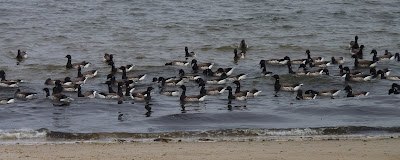 |
| White-crowned Sparrow / Photo by Tom Koerner/USFWS |
Birds and birding news
- Tomorrow is NJ Audubon's World Series of Birding, a big day tournament to raise money for conservation. Like last year, this year's tournament is following special rules due to the pandemic (pdf). As in the past, I will be part of the Middlesex Merlins; here is a link to our team page for fundraising.
- Tomorrow is also World Migratory Bird Day and eBird's Global Big Day, and eBird is offering free access to its Birds of the World encyclopedia for the weekend.
- A rare Broad-billed Hummingbird made it all the way to Chicago.
- Like coffee farms, cocoa farms can support wintering migratory birds if natural habitat is preserved nearby.
- Scientists have fitted 10 Little Blue Penguins with tracking devices to map their foraging routes and methods.
- Researchers found a link between how much food male Hoopoes bring their mates and how well the females paint their eggs.
- A British study found that migratory birds called more often when flying over brightly-lit urban areas.
- The Bornean subspecies of the Rajah Scops-Owl was documented in the wild for the first time since 1892. The sighting came during a survey of the bird populations around Mount Kinabalu.
- A California Condor chick hatched in Pinnacles National Park last month. If it survives, it should fledge sometime in the fall. Meanwhile, one homeowner had an overabundance of condors this week.
- The rufa subspecies of Red Knot is still in danger of extinction, and the major limiting factor on its population is still a lack of horseshoe crab eggs at migratory stopover sites. While commercial fishing has been restricted, horseshoe crab blood is still being used to test pharmaceutical products.
Science and nature blogging
- BirdCast: Caribbean Cruisers: visible migration along the Atlantic Coast of Florida
- 10,000 Birds: Birds on Utility Poles - The Electrocution Solution
- Feathered Photography: Eared Grebe – An Unusual Feeding Behavior
- Vermont Center for Ecostudies: Field Guide to May 2021
- Avian Hybrids: Gene flow is an integral part of speciation in Beringian birds
- Laura's Birding Blog: Gee Whiz: A Sad Loss
- The Meadowlands Nature Blog: Don Torino’s Life in the Meadowlands: A Reminder to Plant Milkeed in Every Yard!
- Arachnofiles: Arachnews: May 3, 2021. Back from the dead
- Backyard and Beyond: Return to the Prairie
- On The Wing Photography: Great Blue Heron In Flight Photos
- Ohio Birds and Biodiversity: Lady's-slippers in a spring forest
Biodiversity and conservation
- Periodical cicadas like Brood X depend on beneficial bacteria that help them produce amino acids, and fragmentation of the bacteria threatens their long-term survival.
- Here is a list of locations in New Jersey where Brood X has historically emerged.
- Sightings this year should be reported to Cicada Mania (as well as other community science sites like iNaturalist) to update the range maps.
- Camera traps are documenting the animals using El Tuparro National Natural Park in Colombia.
- Even though administrations have changed, the Interior Department is still delaying a decision on whether to list Tiehm's Buckwheat, a plant in the way of a lithium mine, as an endangered species.
Climate change and environmental politics
- California is beginning steps to wind down oil production, starting with a ban on new fracking permits by 2024 and an end to all oil drilling by 2045.
- The emissions goals set by wealthy nations would result in a global temperature rise of 2.4°C by 2100, which is significantly above the goal set by the Paris agreement.
- The Biden administration is cancelling the portions of border wall paid for by the defense budget, but it has not announced what will happen with the parts paid for through the regular DHS budget.
- A section of privately funded wall is still in litigation regarding its effects on the National Butterfly Center and whether it violates the boundary water treaty with Mexico.
- The Gulf Stream is migrating closer to Atlantic Canada and blocking the colder Labrador Current. The change explains rapid warming in northeastern North America and has implications for fisheries.
- The Biden administration has pledged to protect 30% of U.S. land by 2030, but the details are still unclear. Meeting the goal would probably require cooperation from private landowners.







